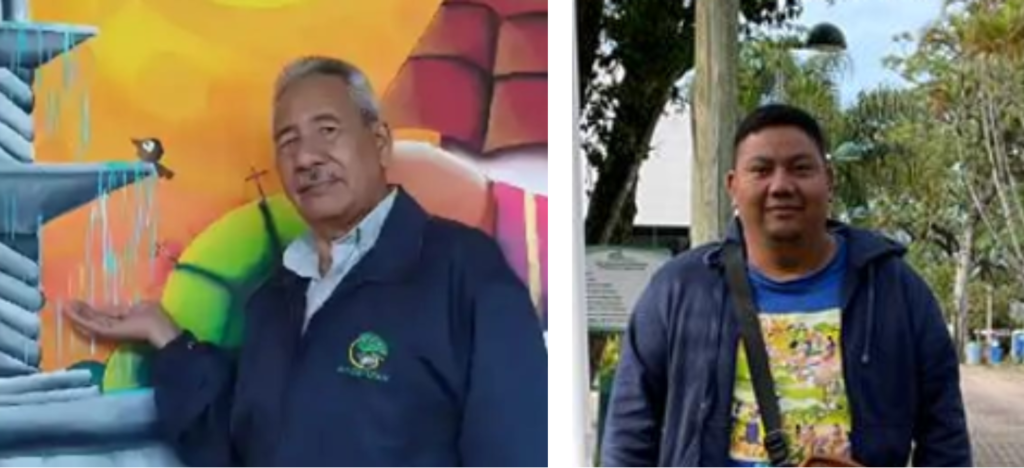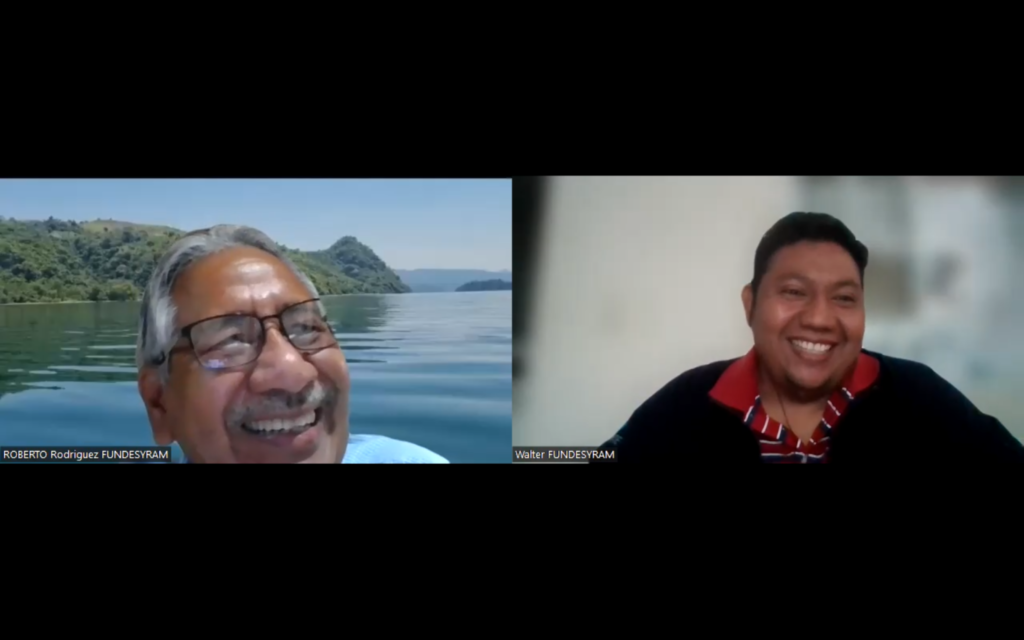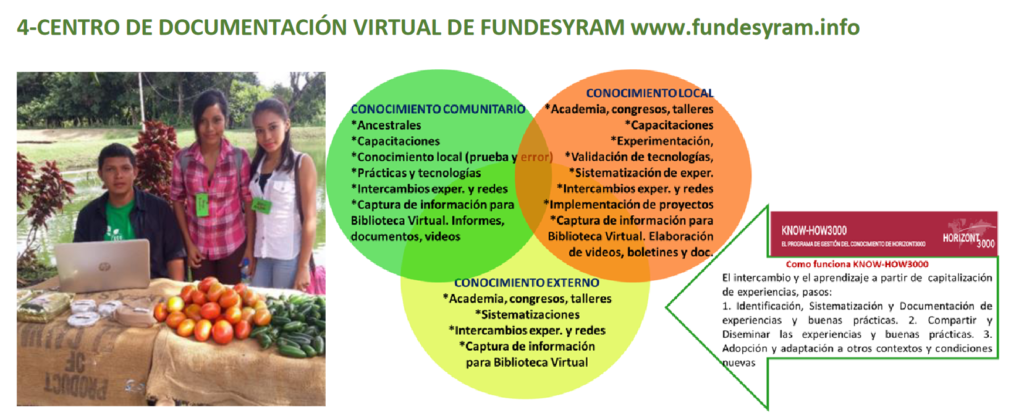Make Your Experiences Count. They Can Change the World.
LET’S BRING ALL OF OUR KNOWLEDGE AND EXPERIENCES TOGETHER.
TOGETHER WE KNOW MORE. TOGETHER WE ACHIEVE MORE. TOGETHER WE DO BETTER.
LET’S BRING ALL OF OUR KNOWLEDGE AND EXPERIENCES TOGETHER.
TOGETHER WE KNOW MORE. TOGETHER WE ACHIEVE MORE. TOGETHER WE DO BETTER.
Published: November 29, 2022
“FUNDESYRAM’s virtual library is worth gold! It is an extraordinary contribution to knowledge management in the field of agroecology, both highlighting the importance of women’s work and their connections to the environment.“
– Christina Hörnicke, Regional Director Central America, HORIZONT3000
The Salvadoran organisation FUNDESYRAM is well known among many people working on agroecology in Central America and beyond. FUNDESYRAM is short for “Foundation for Socio-Economic Development and Environmental Restoration” and in the last 30 years they have worked in this very area, improving the quality of life of rural and urban population in a comprehensive and participative way.
What is perhaps less well known is that their website fundesyram.info, as well as the accompanying YouTube-channel, are real treasure troves for all those seeking practical information and advice on all things related to organic farming and ecology. Within the framework of knowledge management, FUNDESYRAM not only runs this vast archive, but is also very active in disseminating its contents.
To learn more about how they do it, I met Roberto Rodriguez, director of FUNDESYRAM, and his colleague and administrator of the platform, Walter Santillana, for an online interview.

How did fundesyram.info come about as a knowledge management tool?
Roberto: When we started with organic agriculture and ecology, the flow of information was quite limited and there were many who had information, but did not share it. Since 2007 we already had our website, where we uploaded photos and reports, but it didn’t have much of a system.
The first leap in quality came in 2011. I went to Vienna to a conference on Rural Development organised by KNOW-HOW3000 – there were people from all regions: Asia, Africa, America, Europe. There I realised that many people have similar problems and that some clues from what other organisations and farming families are finding could be useful to all of us, as long as they are shared.

So that is how the idea of the virtual library of agroecological technologies came about: a little bit to compile our information and a little bit to learn and share it as well. The idea was to bring together what we had plus what we captured through different media. Our concrete approach is: what we learn, we share, and what we don’t know, we look for, we validate in the field through the whole technical team, and we make it accessible to others.
Today our website has ten sections that relate to our integral work, among these: 1. Home section, where we highlight the latest information and eco products, 2. Our newsletter “Towards Development”, 3. Our more technical documents, 7. contact section, 8. Articles from the Agroecological Network of El Salvador (RAES), 9. Our intervention in the Apaneca-Ilamatepec Biosphere Reserve and 10. Arts and culture section.
What kind of documents do you upload to this virtual library?
Roberto: For example, there are guides, publications and also evaluations and systematisations. When we finish a project, we always make a kind of summary. And in these documents, we try to systematise the experiences, lessons learned, conclusions and recommendations, in our own way.
Before, with the need to make printed documents, it was more difficult to do it in that depth. Today, with the ease of making digital documents, we do it whether we have funds or not. Of course, people in the field like to have it in physical form. So when we have resources, we share printed material, but it’s not always possible, is it? In addition, we have a colleague who has skills in popular education and there are also workshops and face-to-face courses.
All of this doesn’t conflict, it complements each other. That is to say, maybe someone finds out about the topic of producing organic farming products by following our social networks. Then if they want to go deeper, they go to our website and find documents about the process and the results in our library. And if you want to see something more practical about the production, you go to our YouTube channel and find instructional videos. And when a group of interested people get together, there are also face-to-face courses, right? So, little by little we have been integrating different aspects and today we have all these options, and yes, it also includes the whole issue of social networks.
I think that’s a very interesting part of it. I mean, one thing is to elaborate and gather all that material and the other thing is how to share it and make sure that people who need it find it and use it. Which channels do you use for that, apart from the website?
Walter: We have a channel on YouTube, on Instagram, TikTok, and there’s Facebook as well. Here in El Salvador, what is most used is Facebook. And also TikTok – it’s becoming quite popular.
Recently, we went to Brazil and we realised that people are well aware of all the information that we are sharing on the different social networks. But we were surprised to find that they use Instagram more. For the area here in El Salvador, it’s Facebook, but especially in the southern part of Brazil they use Instagram more.
It also depends on the content you want to share. In the case of Facebook, what is most consumed there is training material and instructional videos. On Instagram, what is most consumed are shorter news items: photographs, short videos, announcements of activities. It is a marked difference. But for the moment we can say that YouTube is the most important for learning, because that is where FUNDESYRAM has a lot of tutorial videos and some are quite long, covering a lot of ground.
Roberto: So it’s quite varied, also in terms of age: according to the statistics, YouTube is seen more by somewhat older people, Instagram is more for the younger ones, Facebook for the intermediate ones, and TikTok for the youngsters. The idea is to reach all audiences.
And of course we are also linking up with other platforms. For example, we participate in a Pan-American agroecology network. So it’s a very dynamic process, and our colleagues share some things on their own networks and so on. But the official thing is the social networks that Walter mentions.
I hear you are also very active on WhatsApp.
Roberto: Yes, mostly I’m the one who shares there. I already have the discipline of no more than 10 minutes a day ((laughs)). It doesn’t cost me anything to do it and it can be posted at any time. Once I have the material, it’s very easy to forward it. Because sometimes there are valuable documents that don’t circulate much in other media and that’s how you have them. That’s why I share them on WhatsApp and that way people are motivated to share them too.
Some people might get angry that they receive a lot of large documents and it fills up their memory. But it is the up to each person: if there is something they are not interested in, they delete it and if they are interested, they download it or review it. That’s how we make progress. Little by little we are building networks and different groups with different interests. For example, we also have a more specific internal group called ‘Eco-Communities’ and there we are sharing some activities and actions that are carried out in rural areas. And what I think could be interesting for another group I take from there and share it.

Since 2011 you also have a very extensive monthly bulletin, called “Camino al desarrollo”?
Roberto: This bulletin is where the colleagues do suffer. At the beginning of the year, we define 12 themes and according to the themes I designate one of the colleagues who is going to coordinate the theme. For example, this month it was Walter’s turn. He makes sure that the colleagues write 1-2 pages or, if they don’t know the area, that they do an interview or something like that, and then Walter does the revision.
Of course, there are always colleagues who don’t manage to deliver something on time. So the last strategy we have found is a kind of traffic light system. If some colleagues see that they are already in the red, they hurry to submit something ((laughs)).
Roberto: It’s a lot of work to share knowledge, but that’s how we move forward. That’s our institutional culture: we want to document and pass on what we learn. And institutionally it has worked for us, many people are aware of us. When Thomas [Vogel] came to visit us, he told us that for HORIZONT3000 we are a reference in agroecology. But it’s because of all this, not just because of the field work, because this is complementary to the field work. And we have understood that it is an essential part of our whole process.